- DETERRENCE: Navy Seeks Sub Replacement Savings: From NASA Rocket Boosters To Reused Access Doors
- DPRK: S. Korea, U.S., Japan Lower Bar for Nuclear Talks with N. Korea
- GOVERNANCE AND CIVIL SOCIETY: U.S. Alarmed about Plutonium Stockpile Growing from Rokkasho Plant
- CLIMATE CHANGE ADAPTATION: Climate Stress, Behavioral Adaptation and Subjective Well Being in Coastal Cities of India
- ENERGY SECURITY: U.N.: Time is Running Out for Climate Change Action
- AUSTRAL PEACE AND SECURITY: On ‘Freedom and Security’
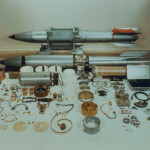 DETERRENCE: Navy Seeks Sub Replacement Savings: From NASA Rocket Boosters To Reused Access Doors, Sydney Freedberg, Breaking Defense News, April 7, 2014
DETERRENCE: Navy Seeks Sub Replacement Savings: From NASA Rocket Boosters To Reused Access Doors, Sydney Freedberg, Breaking Defense News, April 7, 2014
New strategic nuclear submarines will recycle used pressure doors from retired Ohios; budget cuts mean less nuclear powered submarines in the Western Pacific; B61 nuclear bombs for strategic bomber missions face upgrade delay. The nuclear triad is eroding slowly inside-out.
- US: The Era of Nuclear Neglect, Peter Huessy, Gatestone Institute, April 15, 2014
- Locklear: US Attack Submarine Needs Going Unmet in Pacific, John Bennett, Defense News, March 25, 2014
- Pentagon: B-61 Bomb Update Faces Possible Delays, Diane Barnes, Global Security Newswire, April 7, 2014
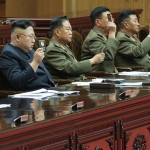 DPRK: S. Korea, U.S., Japan Lower Bar for Nuclear Talks with N. Korea, Yonhap News Agency. (14 April 2014)
DPRK: S. Korea, U.S., Japan Lower Bar for Nuclear Talks with N. Korea, Yonhap News Agency. (14 April 2014)
North Korean’s official reaction to South Korea President Park Guen-hye’s “Dresden speech” via the National Defense Commission is negative, but does not completely proscribe future interaction. The language also indicates an unofficial no-name calling truce is over. As if to underline the limited flexibility, several heads of the Six Party Talks will soon meet in New York City. It is unusual, but not unprecedented for them to meet in New York City. The venue is special since it is also the location for one a very few direct channels between the U.S. and North Korea. North Korea’s drone is forcing South Korea to look into technology to detect and destroy drones, making it even more unlikely North Korea will be be able to move anything by air into South Korea.
- NDC spokesman blasts Park Guen Hye’s “Dresden Declaration”, (North) Korea Central News Agency. (12 April 2014)
- South Korea turning to German laser cannon to deal with North Korean UAVs, Bauhinia (Hong Kong Orchid). (11 April 2014) [Chinese Language]
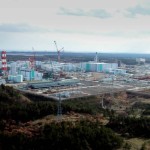 GOVERNANCE AND CIVIL SOCIETY: U.S. Alarmed about Plutonium Stockpile Growing from Rokkasho Plant, Toshihiro Okuyama, Asahi Shimbun, 13 April 2014
GOVERNANCE AND CIVIL SOCIETY: U.S. Alarmed about Plutonium Stockpile Growing from Rokkasho Plant, Toshihiro Okuyama, Asahi Shimbun, 13 April 2014
The Japanese government’s new energy plan includes plans to reprocess its spent nuclear fuel and increase plutonium stockpiles, raising concerns from the US and China. The US is concerned that this could have a negative effect on nuclear negotiations with other countries, including South Korea. China has also expressed concern that Japan’s stockpiles are “far exceeding its normal needs”.
- Japan reaffirms its plan to produce plutonium, Douglas Birch and Jake Adelstein, Center for Public Integrity, 11 April 2014
- Japan’s plutonium plans stoke China tensions on A-bomb risk, Jonathan Tirone and Jacob Adelman, Bloomberg, 24 March 2014
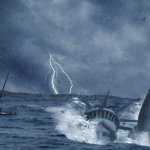 CLIMATE CHANGE ADAPTATION: Climate Stress, Behavioral Adaptation and Subjective Well Being in Coastal Cities of India, Parul Rishi and Ruchi Mudaliar, American Journal of Applied Psychology, vol. 2, no. 1, pp. 13-21 (2014) [350 KB, PDF]
CLIMATE CHANGE ADAPTATION: Climate Stress, Behavioral Adaptation and Subjective Well Being in Coastal Cities of India, Parul Rishi and Ruchi Mudaliar, American Journal of Applied Psychology, vol. 2, no. 1, pp. 13-21 (2014) [350 KB, PDF]
Out of the several projected impacts of climate change in India, coastal zones are apprehended to suffer the most devastating effects owing to the vast sea-side development and huge populations in the vicinity of the coast. Therefore, there is a pressing need to address issues related to climate stress, adaptation, vulnerability and coping in coastal cities of India, especially from the psychological perspective.
- Guide to Climate Change Adaptation in Cities, The International Bank for Reconstruction and Development/The World Bank (2011) [1.57 MB, PDF]
- Behavioural Mapping of Indian Urban Settlements towards Changing Climate: An Empirical Study, Parul Rishi, MD Omprakash and Ruchi Mudaliar, Indian Institute of Forest Management, Bhopal, India (2008) [792 KB, PDF]
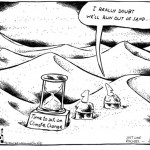 ENERGY SECURITY: U.N.: Time is Running Out for Climate Change Action, Sam Frizell, TIME, 13 April 2014
ENERGY SECURITY: U.N.: Time is Running Out for Climate Change Action, Sam Frizell, TIME, 13 April 2014
As always, time is running out. Drums roll, the mouse comes out in the circus ring. Another salvo in a cultural war of the talking heads, perhaps the last sigh of a inter-governmental mammoth. No doubt the planet is getting warmer, but good doubt as to what will cool the tempers. Time alone will tell whose game is up. At least, we’ll never run out of sand.
- The game is up for climate change believers, Charles Moore review of The Age of Global Warming by Rupert Darwall, Telegraph (6 April 2014)
- TV just came around on global warming. Will anyone care?, Jason Plautz, National Journal (14 April 2014)
 AUSTRAL PEACE AND SECURITY: On ‘Freedom and Security’, Angela Merkel, New York Review of Books (20 March 2014)
AUSTRAL PEACE AND SECURITY: On ‘Freedom and Security’, Angela Merkel, New York Review of Books (20 March 2014)
Truth or consequences: US allies must make choices. After Snowden, Germany’s Angela Merkel said “No, that cannot be right. For it touches the core of what matters in cooperation between friendly and allied states: trust.” Australia is choosing suppression of memory of the worst years in Indonesia’s Timorese colony, lest relations with Indonesia be made still worse, or US sources outed. As Merkel concludes: “In the end there is less, not more, security.”
- Australia wins legal battle to suppress secret papers on East Timor ‘for fear of upsetting Indonesia’, Philip Dorling, Sydney Morning Herald (3 April 2014)
- Keeping secret (some) Australian goverment archives, John Waddingham, Timor Archives – Clearing House for Archival Records on Timor (CHART) (16 April 2014)
- Victims’ right to the truth, Pat Walsh, (24 March 2013)
The Nautilus Peace and Security Weekly Report presents articles and full length reports each week in six categories: Austral security, nuclear deterrence, energy security, climate change and security, the DPRK, climate change adaptation and governance and civil society. Our team of contributors carefully select items that highlight the links between these themes and the three regions in which our offices are found—North America, Northeast Asia, and the Austral-Asia region.
- Subscribe to NAPSNet to receive free weekly email reports editor:
Contributors:
- Deterrence: Peter Hayes
- Governance and Civil Society: Dyana Mardon
- Climate Change Adaptation: Saleem Janjua
- DPRK: Roger Cavazos
- Austral Peace and Security: Richard Tanter

